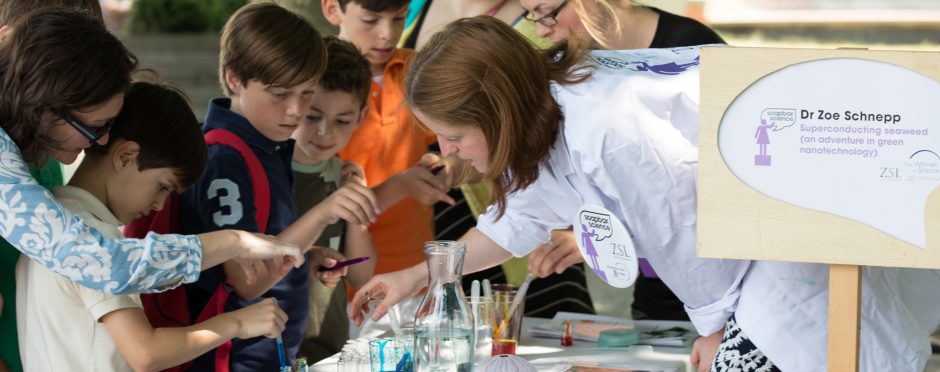 By Professor Eleanor Highwood, University of Reading.
By Professor Eleanor Highwood, University of Reading.
Ellie will be on her London soapbox this Sunday, 29th of June, 12-3. Come and listen to her talk entitled “When smoke gets in your skies: the effect of atmospheric aerosols on weather and climate” this Sunday on the Southbank!
Soapbox Science asked “what one thing would you change about the culture surrounding science at the moment?”. If I could wave a magic wand, I would remove the labels “hard” and “difficult” from science, maths and engineering. Labelling something as difficult instantly puts up a barrier for people with lower self-confidence. This might be the young, the more senior, women, those with low disposable income, those with little family experience of education or access to cultural opportunities. I don’t believe that science and maths are actually harder than any other subjects we might study at school. To study anything to high level is hard, to become expert or at least competent in most things requires a lot of practice, experimentation, successes and failures. I would argue that it is the determination and passion that is needed to become a subject specialist that is hard, rather than the subject itself. Undoubtedly, becoming a science specialist is easier if you have support and access to materials, laboratories, enthusiastic and competent teachers and experiences, but this is also true of any other subject area you choose to follow.
In fact we all use scientific thinking every day, for example, in deciding whether to cross the road we have a picture in our heads (conceptual model) of how cars move (based on our previous observations of cars), we estimate the speed of the car compared to where we are, we assess the likely outcomes and make an evidence based judgement whether to step off the pavement to perform the experiment. Assuming that our model and estimates were good, we will reach the other side of the road and record that we survived that encounter. Babies are natural scientists and experiments because observing, exploring and experimenting is the only way they can learn. Repeatedly dropping things from a highchair is an experiment that tells babies that broadly the same things happen when you drop something, that liquids tend to make mess over a wider area, and that parents will react to this activity.
Clearly, sometime after early childhood, science and maths get labelled as “hard” which then gives people a reason not to engage with these subjects. My heart sinks when I hear parents at the school gate saying “She/he is just like me – maths is too hard for us”. Given the strong influence that parents have on primary school age children, teachers have an uphill battle to keep interest alive in science and maths. . Re-labelling science entirely as “experiments” might help, but perhaps the best they can hope for is to ignite a strong enough science flame that it burns through the extinguishing hormones and social pressures of the teenage years strongly enough such that the glowing embers can be rekindled at A-level. That assumes that the teachers themselves are confident enough to engage children in science and maths – and this is almost certainly affected by the “hard” label given to science in their own educational experience. Thus the “hard” effect perpetuates.
Given that this is for Soapbox Science, I think that the “hard” label effect is also alive and well in the context of science communication. At SciComm2014 this year, we spent a lot of time discussing the “under-served” and “hard to reach” publics that are not already engaged in some science or cultural activity. I much prefer the “under-served” term, because I suspect that the “hard to reach” label means that we are less likely to try. Imagining a world of publics that the science communicators are trying to reach, the “hard-to-reach” would be the equivalent of “the un-explored territories” or even “there be monsters” on an old sea chart. Broadly, reaching the “under-served” publics probably means taking science to those communities, learning different methods, experimenting, and refining our approach in the light of the results.
Perhaps Einstein said it best: “The whole of science is nothing more than a refinement of everyday thinking”.
